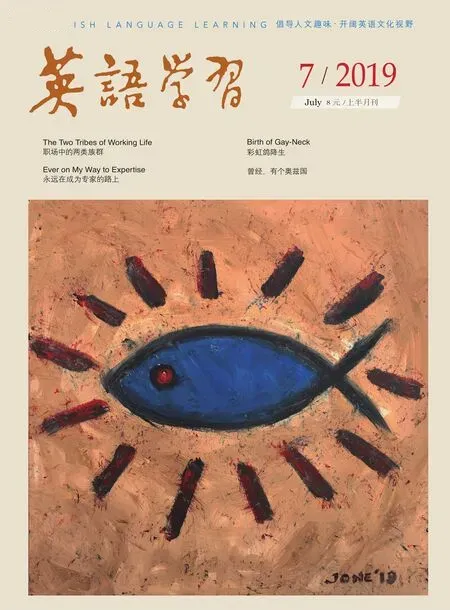曾经,有个奥兹国
2019-07-17王伟滨
∷王伟滨
今年是电影《绿野仙踪》(The Wizard of Oz)上映80周年,那么,我们来谈谈Oz(奥兹国)吧。
小说《绿野仙踪》(原名The Wonderful Wizard of Oz)的作者L. 弗兰克·鲍姆(L. Frank Baum)说,“The oldtime fairy tale, having served for generations, may now be classed as ‘historical' in the children's library; for the time has come for a series of newer ‘wonder tales' in which the stereotyped genie, dwarf and fairy are eliminated, together with all the horrible and blood-curdling incidents devised by their authors to point a fearsome moral to each tale.
Modern education includes morality; therefore the modern child seeks only entertainment in its wonder tales and gladly dispenses with all disagreeable incidents. Having this thought in mind, the story of The Wonderful Wizard of Oz was written solely to please children of today. It aspires to being a modernized fairy tale, in which the wonderment and joy are retained and the heartaches and nightmares are left out.”(陪伴数代孩子的古时童话,如今在儿童图书馆里可能被归入“历史类”了。现在该有一批新“奇幻故事”登场了,老套的精灵、矮人、仙子,以及被作者们设计用来恫吓、教化孩子的每一个故事里可怕、恐怖的情节,都要被去除。现代教育已经包含了道德内容;因此现代的孩子只消在奇幻故事中寻找娱乐即可,欣然不必挂怀所有令人不快的事情。抱着这种想法,我写《绿野仙踪》这个故事就是纯粹逗孩子们开心的。此书旨在讲述一个现代化的童话,保留奇幻与快乐,摒除心痛与噩梦。)
住在堪萨斯的小姑娘多萝西(Dorothy)和她的小狗托托(Toto),被一场龙卷风(cyclone)裹挟到了一个神秘世界——Oz。在那里,她遇到了没有脑筋的稻草人、没有心肝的铁皮人和没有胆量的狮子,四个人一起去住在绿玉城(The Emerald City)的奥兹大法师那里寻求帮助,要一副脑筋、一个心肝、一份胆量和一条回家的路。这个孩子的故事,在今天的成年人读来,自然晓得它其实说的是一个人的成长。脑筋、心肝、胆量,这三样构成人之根本的东西,在一番历险之后都得到了,而小姑娘也发现,回家的法宝其实一直穿在她的脚上,双脚碰一碰,她就回家了。
学者宰普斯(Jack Zipes)在企鹅版《绿野仙踪》的前言中写道:“Home Sweet Home. When Dorothy Gale returns to Kansas at the end of her adventures in the land of Oz, she declares that there is no place like home, and she appears content to be back on the farm with her Aunt Em and Uncle Henry. ... But it is a lie. Dorothy does not yet know what home is. ... home cannot be found in America. Home is Oz, a transcendent utopian paradise, that must be protected from America.”(家,美好的家。奥兹国历险结束,多萝西·盖尔返回堪萨斯,她说,哪里都不如家好呀。看上去,回到农场里埃姆姨妈和亨利姨父身边,她很满足……但那其实是谎话。多萝西还不知道家是什么……家,没法在美国找到。家,在奥兹,那是一个超脱俗世的乌托邦乐园,必须要保卫它免遭现实美国的摧毁。)

电影《绿野仙踪》海报
宰普斯的话让我想起多年前的一本书,名叫Was (《曾经》),与Oz发音相近。封面上,蓝天下,是黄砖路(The Yellow Brick Road),两旁是茂密的麦田,远方是一座山,山那边,影影绰绰的不知是什么。这本书写了三个时间里,寻找着奥兹这个“家”的三个人:1875年,一个名叫多萝西的小女孩,因为父母去世,便和自己的小狗托托来到堪萨斯,投奔姨妈、姨父;1939年,正在拍摄《绿野仙踪》的童星朱迪·加兰(Judy Garland),因为失去父母,孤身一人在好莱坞讨生活;1989年,一个过气的演员——曾经扮演稻草人,如今身患绝症,独自前往堪萨斯,去探查一段历史。
堪萨斯,原本是印第安人的家园,后来,在东部生活艰难的白人迁来,把印第安人赶走了,他们在这片土地上垦殖。再后来,堪萨斯要建“州”了,更多的白人来到这里,南方人、北方人都来了,各自带着不同的政治主张,剑拔弩张。争斗了十几年,最后,一场大战,表面上终于有了个结果,实际上,却并没有解决什么问题。
1875年。来自密苏里圣路易斯市(St. Louis, Missouri)的小姑娘多萝西,并不知道多少大人的事,但是她能感觉到自己在这里不受欢迎。这片标榜着“自由之州”(Free State)的土地,至少对孩子来说,并没有什么“自由”可言。
“‘Dorothy,' said Aunty Em. ‘See that grass there? That marks a wallow. Now you must be careful of the wallows, whenever you see them. They're quicksand. Children disappear into them. There was a little girl who got swallowed up in the buffalo wallows and was never found again.'”(埃姆姨妈警告说:“多萝西,看见那片草地了吗?那里有个泥潭。不管什么时候你见到泥潭,一定要特别小心。它们就像流沙,专吞小孩子。有个小女孩就被水牛打滚儿的泥潭给吞掉,再也找不见了。”)在奥兹,所有的波折最后都能克服,所有的坏人都被惩罚,在奥兹,没有什么解决不了的事;但在真实的堪萨斯,处处都是“泥潭”,一旦跌落进去,便再无生还的可能。要想不被“吞噬”,只能变作身躯庞大、皮糙肉厚的水牛。
为了能在这片荒蛮的土地上生存下去,渐渐地,人们都被消磨得感觉迟钝了:在这里,泡泡纱的仙女裙要烧掉,小狗托托要拴在院子里,就连一头漂亮的卷发也得剪掉……来到堪萨斯的第一天,多萝西学会了“憎恨”。她渴望长大,不为别的,为的是在将来,她可以像姨妈伤害她那样去伤害姨妈。
有一天,她还要学会憎恨那个强暴她的亨利姨父,憎恨嫌恶她的同学,憎恨所有堪萨斯的人。
在冰冷的堪萨斯,只有一个名叫威尔伯(Wilbur)的男孩子,对多萝西足够温情:“A few days before, Dorothy and Wilbur had made angels in the snow on the top of the hill. They had lain down on their backs and waved their arms up and down. That made a shape like wings. The
trick was to stand up from the snow, and then jump away, so that there were no footprints leading from the image. Then you could say that it was a place where an angel had gone to sleep. Will would lean out and lift Dorothy out of hers. So hers were the best.”(几天前,多萝西和威尔伯在山顶的雪地里做天使。他们躺在地上,上下挥舞手臂,在地上做出翅膀的形状。诀窍就是,从雪地上站起来,然后跳开,这样才不会在图案旁留下脚印。然后你就可以说,有天使曾经在这里睡过觉呢。威尔总是欠身去把多萝西拉起来,这样她的天使图就最完美。)
不过,在多萝西到来的那年圣诞节,威尔伯就上吊自杀了。他不喜欢这个冰冷的地方,他希望离开这里,一直向西,因为那里据说住着希望,住着有趣的印第安人。但他还是自杀了,因为他没有勇气离开这里,他没有信心能在陌生的地方开始一段新的生活。
如今,威尔伯不在了。“And there were the angels in the snow, a tall one next to a little one. The trick was to leave no footprints, as if you had lain there for a time, and f lown away to Heaven.”(他们的天使还在雪地里,一大一小紧挨着。诀窍是不要留下脚印,就像你曾经在那里躺过一会儿,然后就飞到天国去了。)
后来,从遥远的“瓷器国”(China)又来了个像瓷人儿一样精致、乖巧的苏太太,但是多萝西明白,在这个粗粝的地方,她一定很容易就会碎掉;也许,当地人无意伤害她,但她一定会被伤害:“She began to pour the tea, and to pass the cakes, looking up hopefully, to make sure that everything was all right, that she had done nothing wrong. And Dorothy knew, just from looking, that Mrs Sue was alone in Kansas, and that she was trying as hard as she could, but that she and these women would never be friends, no matter how correct they all were, no matter how polite. It was all done in hopefulness, and was doomed to failure.”(苏太太倒茶、递蛋糕,满怀希望地看着她们,希望事事都做对了,希望没有犯错。只是看着她,多萝西就明白,苏太太在堪萨斯很孤单,她尽其所能,但是她和这儿的女人们永远也不会成为朋友,不管她们都多规矩,多客气。一切都是满怀希望地去做,一切又都注定会失败。)能够在这里生存下来的,都是铁、石头做的,都要足够冰冷、坚硬,苏太太不行。

影片中的多萝西和小狗托托
毒辣的太阳总要出现,没有温暖,却充满怨毒,它会融化冰雪天使,会晒裂陶瓷女人;主宰这里的,是冷酷的自然和冷酷的人。渐渐地,多萝西也适应了这里,也变得坚硬、冰冷。
一天,从遥远的纽约来了个弗兰克,一个四处转的演员,没活儿的时候,他就来当代课老师。他让被这片土地“风干”了的多萝西看到些许希望,也感到更多悲伤。“Could she plant a tree and call it Frank? Frank, she whispered as she fried sausages. She thought of his smooth hands, his one clean suit, his funny hat, his groomed mustache, his light and pleasing tenor voice. She thought of his kind and handsome face. His name seemed to sum up everything that was missing from her life. Frank, she thought, as she lay down that night. She thought of her own unworthiness, and tears stung the lower edge of her eyes. It was as if she were in a boat cast adrift, never to come ashore to some green and happy land, where people laughed and everything was beautiful. She herself had cast the boat adrift, and there was no going back. Now she would never get home. Now she would never be where Frank was. He was too good for her. She began to hate him just a little. And said his name again.”(她能种一棵树,叫它弗兰克吗?在煎香肠时,她小声念着,弗兰克。她想念他光滑的双手,他仅有的一件干净西装,他有趣的帽子,修剪齐整的胡子,轻快、好听的男高音。她想念他友善、英俊的脸庞。他的名字涵盖了她生命中缺失的一切。晚上她躺下时,想着弗兰克。她想到自己的不堪,眼泪刺痛她的眼角。好像,她乘着一条四处漂荡的小船,永远不会到达那片郁郁葱葱的乐土,那里人人欢笑,一切美好。是她自己让那小船偏离航向,如今已没有退路。她再也无法回家,无法去到弗兰克身边。他太好了,她无法企及。于是,她开始有一点儿恨他了。然后,她又念叨他的名字。)
多萝西注定永远也无法离开堪萨斯,她要像埃姆姨妈一样,在这里磨钝、变冷、变硬,然后死去。倒是那个爱讲故事的弗兰克老师,带着他的故事,和故事里的另一个多萝西去了远方。
1939年。电影里那个笑得灿烂的小姑娘,就连被人们叫做“The Kid”(孩子)的童星自己,也不知道那是谁,但她知道,那肯定不是自己。这个原本叫弗朗西丝(Frances Gumm)的小姑娘,父亲为了钟爱的剧院而孤独离世,母亲把她丢在好莱坞,让她改了名字,换了样貌。“There is no place like home.”(哪里都不如家好呀。)电影中的孩子一脸灿烂的笑容,念出这一句。但是,嘈杂的摄影棚里,面对着忙碌的人们,“孩子”怎么知道哪里才是家呢?“孩子”长大后,也开始酗酒,后来结婚、离婚,变胖、变丑,像妈妈一样,而且,也“丢弃”了妈妈。生活,就像是一个“环”。
1989年。过气演员乔纳森(Jonathan),在堪萨斯没有找到多萝西的踪迹,他只找到了亨利姨父的墓碑。也许,一百多年前,多萝西最终还是找到了回“奥兹”的路吧。
“Oz came swimming to us out of history, because we needed it, because it needed to be. A book, a f ilm, a television ritual, a thousand icons scattered through advertising, journalism, political cartoons, music, poetry. Had Oz been blocked, it would have taken another form in the world. It could have come as a cyclone.”(奥兹从历史中向我们游过来,因为我们需要它,因为它需要存在。一本书,一部电影,一种电视习惯*,散落在广告、新闻、政治卡通、音乐、诗歌中的一千个形象。如果当初奥兹被阻挡了,它还是要来到这世上,只是换个模样。比如,化作一场龙卷风。)
“Oz is, after all, only a place with f lowers and birds, and rivers and hills. Everything is alive there, as it is here if we care to see it. Tomorrow, we could all decide to live in a place not much different from Oz.”(奥兹,其实不过是个有花、有鸟、有河、有山的地方。那里,一切欣欣向荣,我们这里也可以那样,如果我们在意。明天,我们可以决定生活在一个与奥兹差不多的地方。)
如果我们在意。
